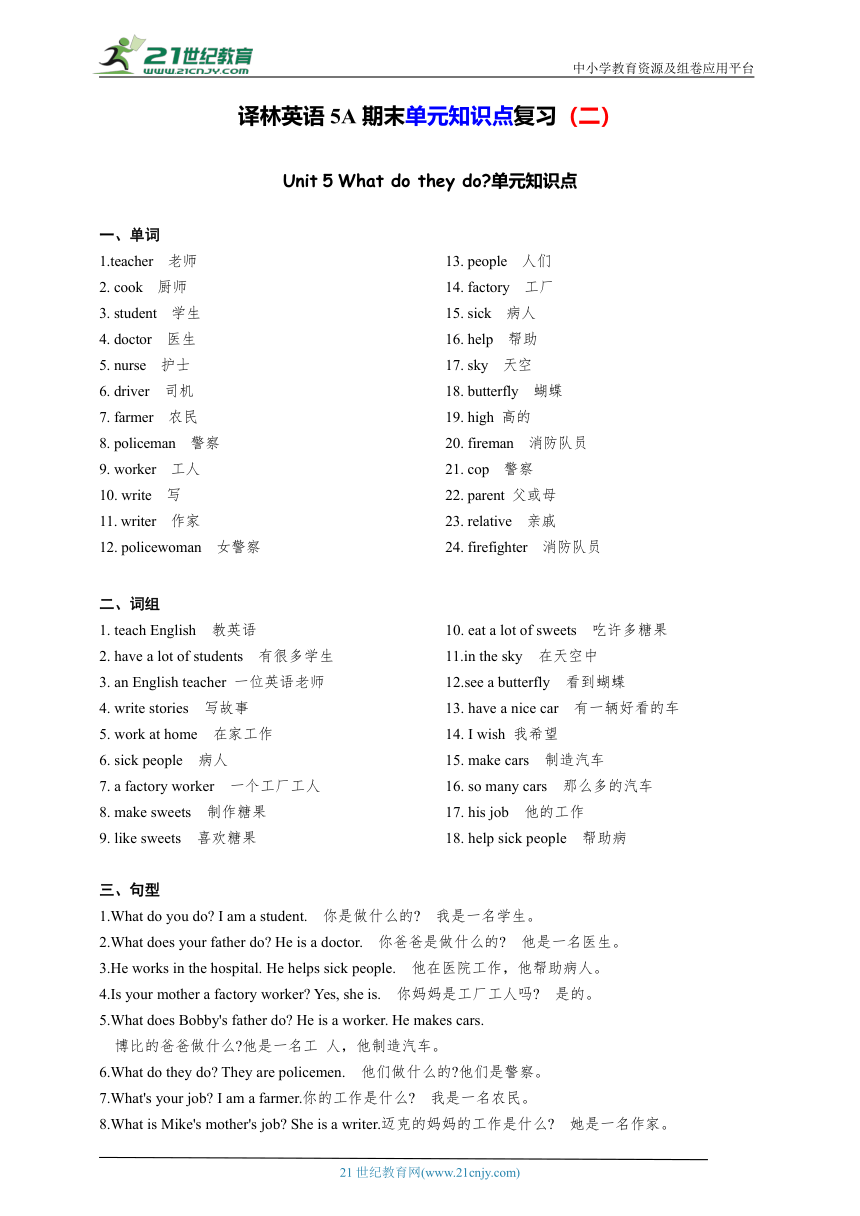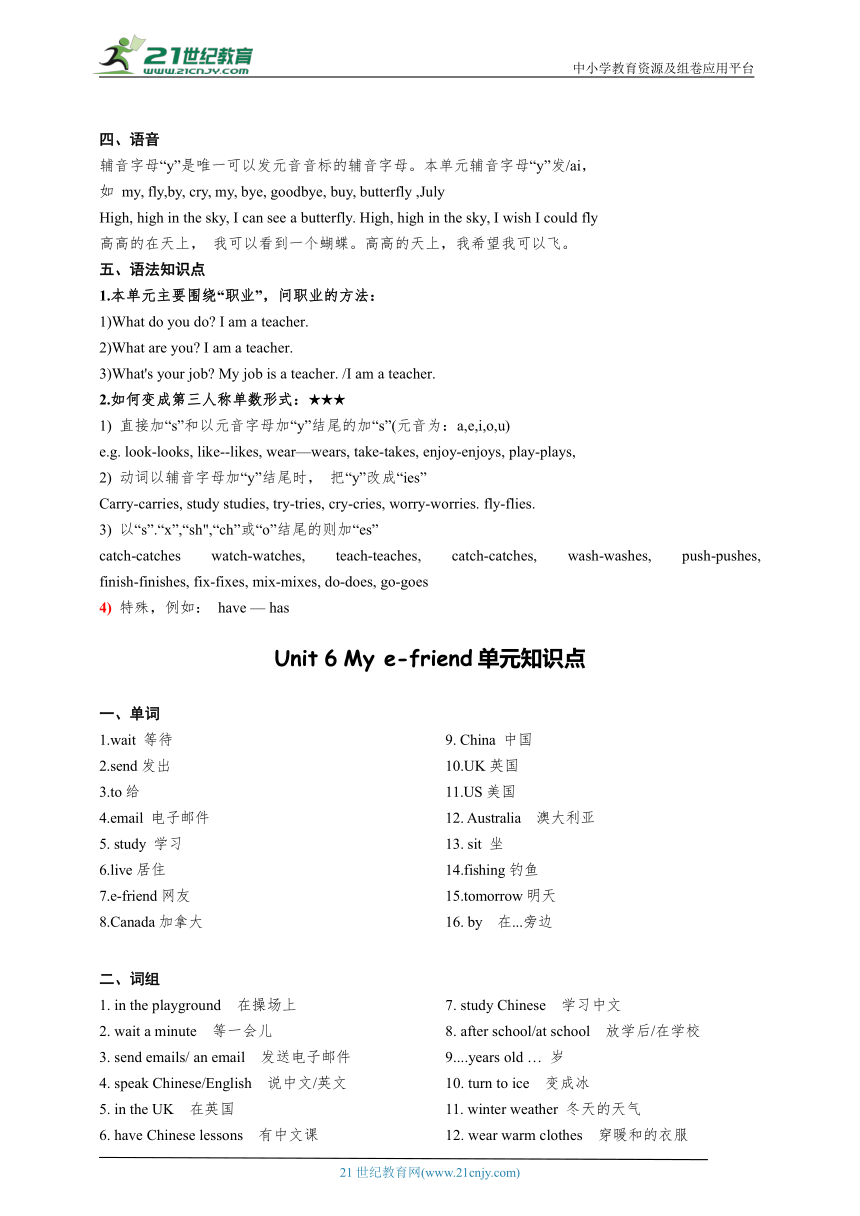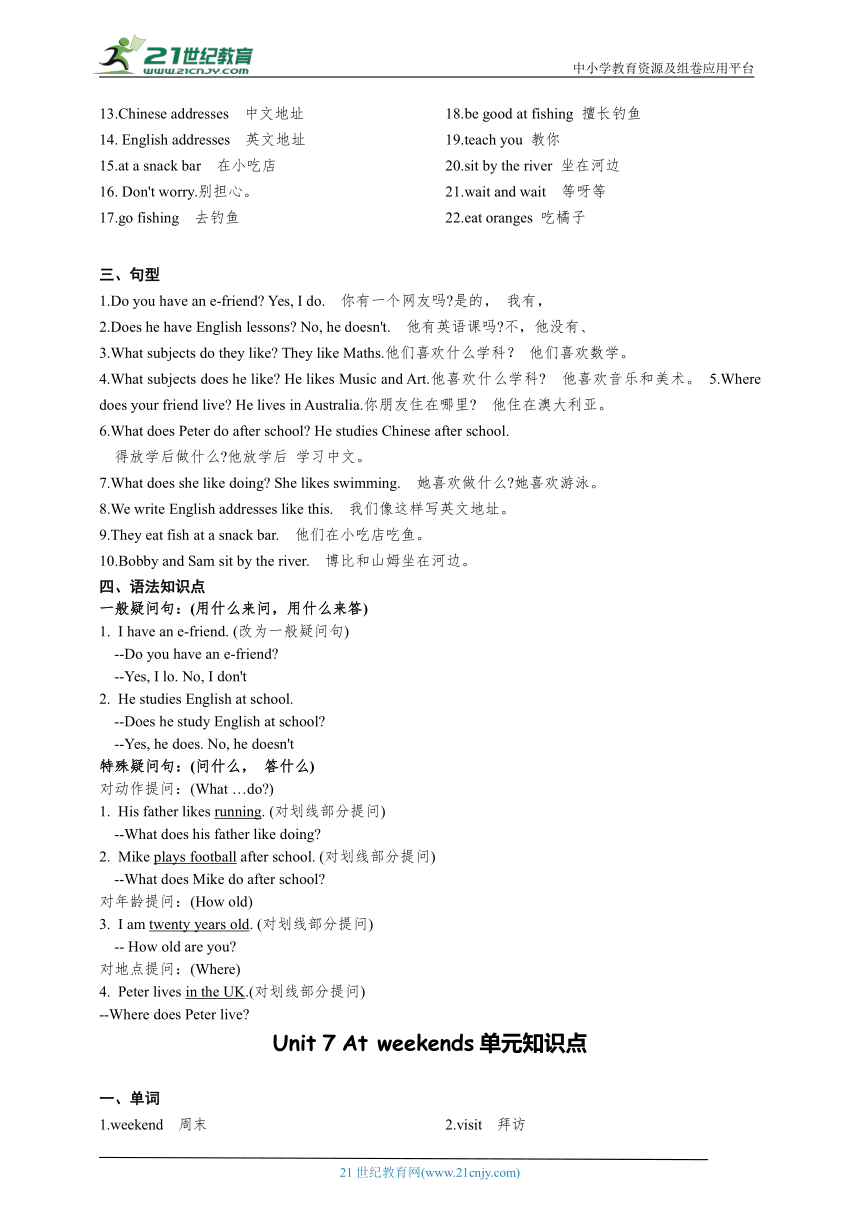牛津译林版小学英语 五年级上册 期末专题-- 单元知识点复习(二)
文档属性
| 名称 | 牛津译林版小学英语 五年级上册 期末专题-- 单元知识点复习(二) |

|
|
| 格式 | doc | ||
| 文件大小 | 1.2MB | ||
| 资源类型 | 试卷 | ||
| 版本资源 | 牛津译林版 | ||
| 科目 | 英语 | ||
| 更新时间 | 2022-11-30 00:00:00 | ||
图片预览



文档简介
中小学教育资源及组卷应用平台
译林英语5A期末单元知识点复习(二)
Unit 5 What do they do 单元知识点
单词
1.teacher 老师
2. cook 厨师
3. student 学生
4. doctor 医生
5. nurse 护士
6. driver 司机
7. farmer 农民
8. policeman 警察
9. worker 工人
10. write 写
11. writer 作家
12. policewoman 女警察
13. people 人们
14. factory 工厂
15. sick 病人
16. help 帮助
17. sky 天空
18. butterfly 蝴蝶
19. high 高的
20. fireman 消防队员
21. cop 警察
22. parent 父或母
23. relative 亲戚
24. firefighter 消防队员
词组
1. teach English 教英语
2. have a lot of students 有很多学生
3. an English teacher 一位英语老师
4. write stories 写故事
5. work at home 在家工作
6. sick people 病人
7. a factory worker 一个工厂工人
8. make sweets 制作糖果
9. like sweets 喜欢糖果
10. eat a lot of sweets 吃许多糖果
11.in the sky 在天空中
12.see a butterfly 看到蝴蝶
13. have a nice car 有一辆好看的车
14. I wish 我希望
15. make cars 制造汽车
16. so many cars 那么多的汽车
17. his job 他的工作
18. help sick people 帮助病
句型
1.What do you do I am a student. 你是做什么的 我是一名学生。
2.What does your father do He is a doctor. 你爸爸是做什么的 他是一名医生。
3.He works in the hospital. He helps sick people. 他在医院工作,他帮助病人。
4.Is your mother a factory worker Yes, she is. 你妈妈是工厂工人吗 是的。
5.What does Bobby's father do He is a worker. He makes cars.
博比的爸爸做什么 他是一名工 人,他制造汽车。
6.What do they do They are policemen. 他们做什么的 他们是警察。
7.What's your job I am a farmer.你的工作是什么 我是一名农民。
8.What is Mike's mother's job She is a writer.迈克的妈妈的工作是什么 她是一名作家。
语音
辅音字母“y”是唯一可以发元音音标的辅音字母。本单元辅音字母“y”发/ai,
如 my, fly,by, cry, my, bye, goodbye, buy, butterfly ,July
High, high in the sky, I can see a butterfly. High, high in the sky, I wish I could fly
高高的在天上, 我可以看到一个蝴蝶。高高的天上,我希望我可以飞。
语法知识点
1.本单元主要围绕“职业”,问职业的方法:
1)What do you do I am a teacher.
2)What are you I am a teacher.
3)What's your job My job is a teacher. /I am a teacher.
2.如何变成第三人称单数形式:★★★
1) 直接加“s”和以元音字母加“y”结尾的加“s”(元音为:a,e,i,o,u)
e.g. look-looks, like--likes, wear—wears, take-takes, enjoy-enjoys, play-plays,
2) 动词以辅音字母加“y”结尾时, 把“y”改成“ies”
Carry-carries, study studies, try-tries, cry-cries, worry-worries. fly-flies.
3) 以“s”.“x”,“sh",“ch”或“o”结尾的则加“es”
catch-catches watch-watches, teach-teaches, catch-catches, wash-washes, push-pushes, finish-finishes, fix-fixes, mix-mixes, do-does, go-goes
特殊,例如: have — has
Unit 6 My e-friend单元知识点
单词
1.wait 等待
2.send发出
3.to给
4.email 电子邮件
5. study 学习
6.live居住
7.e-friend网友
8.Canada加拿大
9. China 中国
10.UK英国
11.US美国
12. Australia 澳大利亚
13. sit 坐
14.fishing钓鱼
15.tomorrow明天
16. by 在...旁边
词组
1. in the playground 在操场上
2. wait a minute 等一会儿
3. send emails/ an email 发送电子邮件
4. speak Chinese/English 说中文/英文
5. in the UK 在英国
6. have Chinese lessons 有中文课
7. study Chinese 学习中文
8. after school/at school 放学后/在学校
9....years old … 岁
10. turn to ice 变成冰
11. winter weather 冬天的天气
12. wear warm clothes 穿暖和的衣服
13.Chinese addresses 中文地址
14. English addresses 英文地址
15.at a snack bar 在小吃店
16. Don't worry.别担心。
17.go fishing 去钓鱼
18.be good at fishing 擅长钓鱼
19.teach you 教你
20.sit by the river 坐在河边
21.wait and wait 等呀等
22.eat oranges 吃橘子
句型
1.Do you have an e-friend Yes, I do. 你有一个网友吗 是的, 我有,
2.Does he have English lessons No, he doesn't. 他有英语课吗 不,他没有、
3.What subjects do they like They like Maths.他们喜欢什么学科? 他们喜欢数学。
4.What subjects does he like He likes Music and Art.他喜欢什么学科 他喜欢音乐和美术。 5.Where does your friend live He lives in Australia.你朋友住在哪里 他住在澳大利亚。
6.What does Peter do after school He studies Chinese after school.
得放学后做什么 他放学后 学习中文。
7.What does she like doing She likes swimming. 她喜欢做什么 她喜欢游泳。
8.We write English addresses like this. 我们像这样写英文地址。
9.They eat fish at a snack bar. 他们在小吃店吃鱼。
10.Bobby and Sam sit by the river. 博比和山姆坐在河边。
语法知识点
一般疑问句:(用什么来问,用什么来答)
I have an e-friend. (改为一般疑问句)
--Do you have an e-friend
--Yes, I lo. No, I don't
He studies English at school.
--Does he study English at school
--Yes, he does. No, he doesn't
特殊疑问句:(问什么, 答什么)
对动作提问:(What …do )
His father likes running. (对划线部分提问)
--What does his father like doing
Mike plays football after school. (对划线部分提问)
--What does Mike do after school
对年龄提问:(How old)
I am twenty years old. (对划线部分提问)
-- How old are you
对地点提问:(Where)
Peter lives in the UK.(对划线部分提问)
--Where does Peter live
Unit 7 At weekends单元知识点
单词
1.weekend 周末
2.visit 拜访
3.parent 父或母
4.Internet 网络,互联网
5.chat 聊天
6.cinema 电影院
7.picnic 野餐
8.grandparent 祖父或祖母
9.always 总是
10.usually 通常
11.often 经常
12 sometimes 有时
13.rose 玫瑰
14.show 展示
15.popular 流行的
16.there 那里
17. spring 春天
18.summer 夏天
19.autumn 秋天
20.winter
词组
1.at weekends 在周末
2.visit my grandparents 拜访我的祖父母
3.play with (their cat)和(他们的猫)一起玩
4.like …very much 非常(喜欢……)
5.chat with them 和他们聊天
6.have dinner with them 和他们一起吃饭
7.on the Internet 在网上
8.have dancing lessons 上舞蹈课
9.go to the cinema 去电影院/去看电影
10.with her friends 和她的朋友们一起
11.have a picnic 野餐
12.with my family 和我的家人一起
13.show us 展示给我们看
14.all the lovely roses 所有可爱的玫瑰花
15.visit Mr. Rose 拜访罗斯先生
16.very popular 非常流行
17.(eat)a lot (吃)很多
18.like picnics 喜欢野餐
e out
20.get out 出来
句型
1.What do you do at weekends I usually visit my grandparents at weekends.
你在周末做什么? 我通常看望我的祖父母。
2.What does she do at weekends She sometimes goes to the cinema with her friends.
她在周末做什么?她有时和她的朋友们去看电影。
3.What do they do at weekends They often fly a kite and have a picnic.
她们在周末做什么?他们经常放风筝和野餐。
4.Su Yang and I like playing with their cat very much.我和苏洋非常喜欢和他们的猫玩。
5.I sometimes go to the park with my family.我有时和我的家人去公园。
6.She always has dancing lessons at weekends.她在周末总是上舞蹈课。
7.My grandparents live in the UK. I usually chat with them on the Internet.
我的祖父母住在英国。我通常在网上和他们聊天。
8.Nancy often has dinner with her grandparents.南希经常和她的祖父母一起吃晚饭。
9.I don’t like playing basketball.我不喜欢打篮球。
10.He doesn’t like playing basketball.他不喜欢打篮球。
11.Billy is too fat. He can’t get out. Billy 太胖了。他不能出去了。
12.Football is very popular in the UK.足球在英国很受欢迎。
13.Basketball is very popular in the US.篮球在美国很受欢迎。
14.Table tennis is very popular in China.乒乓球在中国很受欢迎。
语音
本单元中的辅音字母 s 发/z/
When we visit Mr. Rose, he always shows us all the lovely roses he grows.
每当我们拜访罗斯先生的时候, 他总是会给我们看他种的所有可爱的玫瑰花。
语法知识点
本单元教授了 4 个频率副词:
always > usually > often > sometimes > seldom > never
100% 85% 75% 20% 15% 0%
总是 通常 经常 有时候 偶尔 从不
对这些频率副词提问时,用how often.如,
I Sometimes write to my brother. ----How often do you write to your brother
还有其他频率副词:
Once (一次) twice (两次),once a week 一周一次,twice a day 一天二次
Unit 8 At Christmas单元知识点
单词
1.buy 买
2.present 礼物
3.put 放
4.look 看起来
5.finally 最后
6.early 早早地
7.all 全部
8.card 卡片
9.song 歌曲
10.him 他
11.us 我们
12.letter 信
13.storybook 故事书
14.after 在… 以后
15.pudding 布丁
16.Christmas 圣诞节
17stocking 长筒抹
18.next 接着,然后
19.pretty 漂亮, 好看的
20.thing 物品, 东西
21.wait for 等候,等待
22.message 信息,消息
23.turkey 火鸡
24.children 孩子,儿童
25.Christmas tree 圣诞树
26.Father Christmas 圣诞老人
27.Christmas Eve 圣诞夜,平安
词组
1.buy...for...为某人买...
2.family and friends 家人和朋友
3.go to see Father Christmas 去看圣诞老人
4.put.on...把...放在...上
5.some pretty things 一些漂亮的东西
6.put...under... 把…放在… 下面
7.look great 看起来很棒
8.wait for presents 等待礼物
9.wake up early 早早醒来
10.open our presents 打开我们的礼物
11.have a big lunch/ dinner 吃一顿大餐
12.Christmas pudding 圣诞布丁
13.fold a card 折叠卡片
14.draw a picture 画一张图
15.write your message 写下你的信息
16.Merry Christmas!圣诞快乐!
17.jump up 跳起
18.get yourself wet 把你自己弄湿
19.get juice on my jacket 把果汁弄到我的夹克衫上
20.a lot of fun 许多乐趣
21.sing Christmas songs 唱圣诞歌
22.look sad 看起来伤心的
23.eat us 吃我们
24.send them to.... 把他们发送给...
25.write him a letter 给他写封信
26.read a storybook 读一本故事书
27.have a good time 过得愉快, 玩得高兴
28.on Christmas Day/at Christmas 在圣诞节
句型
1.First, we buy presents. 首先,我们买礼物。
2.Next, we put pretty things on the Christmas tree.接着,我们把漂亮的东西放在圣诞树上。
3.Then, Christmas Eve comes. 然后, 圣诞夜来临。
4.Finally, it is Christmas Day. 最后,是圣诞节。
5.Here's a Christmas card for you. 这是给你的圣诞卡片。
6.What's wrong with him 他怎么了
语法知识点
掌握副词 first, next, then, finally 的用法
它们都是表示时间的副词, 用来说明事情发生 的先后顺序。它们一般放在句首或句末。
2 、have 的用法
1)表示“有”的意思,如:I have a big Christmas tree.我有一棵大圣诞树。
2)表示用餐:have+三餐的名称。如:They have a big dinner at Christmas.
3) 表示“吃;喝”:have+食品或饮料。如:Have some juice, please.请喝些果汁。
4)表示:“进行; 举行”;have+表示某种活动的名称,如:
We sometimes have a picnic at weekends. 在周未我们有时举行野餐。
HYPERLINK "http://21世纪教育网(www.21cnjy.com)
" 21世纪教育网(www.21cnjy.com)
译林英语5A期末单元知识点复习(二)
Unit 5 What do they do 单元知识点
单词
1.teacher 老师
2. cook 厨师
3. student 学生
4. doctor 医生
5. nurse 护士
6. driver 司机
7. farmer 农民
8. policeman 警察
9. worker 工人
10. write 写
11. writer 作家
12. policewoman 女警察
13. people 人们
14. factory 工厂
15. sick 病人
16. help 帮助
17. sky 天空
18. butterfly 蝴蝶
19. high 高的
20. fireman 消防队员
21. cop 警察
22. parent 父或母
23. relative 亲戚
24. firefighter 消防队员
词组
1. teach English 教英语
2. have a lot of students 有很多学生
3. an English teacher 一位英语老师
4. write stories 写故事
5. work at home 在家工作
6. sick people 病人
7. a factory worker 一个工厂工人
8. make sweets 制作糖果
9. like sweets 喜欢糖果
10. eat a lot of sweets 吃许多糖果
11.in the sky 在天空中
12.see a butterfly 看到蝴蝶
13. have a nice car 有一辆好看的车
14. I wish 我希望
15. make cars 制造汽车
16. so many cars 那么多的汽车
17. his job 他的工作
18. help sick people 帮助病
句型
1.What do you do I am a student. 你是做什么的 我是一名学生。
2.What does your father do He is a doctor. 你爸爸是做什么的 他是一名医生。
3.He works in the hospital. He helps sick people. 他在医院工作,他帮助病人。
4.Is your mother a factory worker Yes, she is. 你妈妈是工厂工人吗 是的。
5.What does Bobby's father do He is a worker. He makes cars.
博比的爸爸做什么 他是一名工 人,他制造汽车。
6.What do they do They are policemen. 他们做什么的 他们是警察。
7.What's your job I am a farmer.你的工作是什么 我是一名农民。
8.What is Mike's mother's job She is a writer.迈克的妈妈的工作是什么 她是一名作家。
语音
辅音字母“y”是唯一可以发元音音标的辅音字母。本单元辅音字母“y”发/ai,
如 my, fly,by, cry, my, bye, goodbye, buy, butterfly ,July
High, high in the sky, I can see a butterfly. High, high in the sky, I wish I could fly
高高的在天上, 我可以看到一个蝴蝶。高高的天上,我希望我可以飞。
语法知识点
1.本单元主要围绕“职业”,问职业的方法:
1)What do you do I am a teacher.
2)What are you I am a teacher.
3)What's your job My job is a teacher. /I am a teacher.
2.如何变成第三人称单数形式:★★★
1) 直接加“s”和以元音字母加“y”结尾的加“s”(元音为:a,e,i,o,u)
e.g. look-looks, like--likes, wear—wears, take-takes, enjoy-enjoys, play-plays,
2) 动词以辅音字母加“y”结尾时, 把“y”改成“ies”
Carry-carries, study studies, try-tries, cry-cries, worry-worries. fly-flies.
3) 以“s”.“x”,“sh",“ch”或“o”结尾的则加“es”
catch-catches watch-watches, teach-teaches, catch-catches, wash-washes, push-pushes, finish-finishes, fix-fixes, mix-mixes, do-does, go-goes
特殊,例如: have — has
Unit 6 My e-friend单元知识点
单词
1.wait 等待
2.send发出
3.to给
4.email 电子邮件
5. study 学习
6.live居住
7.e-friend网友
8.Canada加拿大
9. China 中国
10.UK英国
11.US美国
12. Australia 澳大利亚
13. sit 坐
14.fishing钓鱼
15.tomorrow明天
16. by 在...旁边
词组
1. in the playground 在操场上
2. wait a minute 等一会儿
3. send emails/ an email 发送电子邮件
4. speak Chinese/English 说中文/英文
5. in the UK 在英国
6. have Chinese lessons 有中文课
7. study Chinese 学习中文
8. after school/at school 放学后/在学校
9....years old … 岁
10. turn to ice 变成冰
11. winter weather 冬天的天气
12. wear warm clothes 穿暖和的衣服
13.Chinese addresses 中文地址
14. English addresses 英文地址
15.at a snack bar 在小吃店
16. Don't worry.别担心。
17.go fishing 去钓鱼
18.be good at fishing 擅长钓鱼
19.teach you 教你
20.sit by the river 坐在河边
21.wait and wait 等呀等
22.eat oranges 吃橘子
句型
1.Do you have an e-friend Yes, I do. 你有一个网友吗 是的, 我有,
2.Does he have English lessons No, he doesn't. 他有英语课吗 不,他没有、
3.What subjects do they like They like Maths.他们喜欢什么学科? 他们喜欢数学。
4.What subjects does he like He likes Music and Art.他喜欢什么学科 他喜欢音乐和美术。 5.Where does your friend live He lives in Australia.你朋友住在哪里 他住在澳大利亚。
6.What does Peter do after school He studies Chinese after school.
得放学后做什么 他放学后 学习中文。
7.What does she like doing She likes swimming. 她喜欢做什么 她喜欢游泳。
8.We write English addresses like this. 我们像这样写英文地址。
9.They eat fish at a snack bar. 他们在小吃店吃鱼。
10.Bobby and Sam sit by the river. 博比和山姆坐在河边。
语法知识点
一般疑问句:(用什么来问,用什么来答)
I have an e-friend. (改为一般疑问句)
--Do you have an e-friend
--Yes, I lo. No, I don't
He studies English at school.
--Does he study English at school
--Yes, he does. No, he doesn't
特殊疑问句:(问什么, 答什么)
对动作提问:(What …do )
His father likes running. (对划线部分提问)
--What does his father like doing
Mike plays football after school. (对划线部分提问)
--What does Mike do after school
对年龄提问:(How old)
I am twenty years old. (对划线部分提问)
-- How old are you
对地点提问:(Where)
Peter lives in the UK.(对划线部分提问)
--Where does Peter live
Unit 7 At weekends单元知识点
单词
1.weekend 周末
2.visit 拜访
3.parent 父或母
4.Internet 网络,互联网
5.chat 聊天
6.cinema 电影院
7.picnic 野餐
8.grandparent 祖父或祖母
9.always 总是
10.usually 通常
11.often 经常
12 sometimes 有时
13.rose 玫瑰
14.show 展示
15.popular 流行的
16.there 那里
17. spring 春天
18.summer 夏天
19.autumn 秋天
20.winter
词组
1.at weekends 在周末
2.visit my grandparents 拜访我的祖父母
3.play with (their cat)和(他们的猫)一起玩
4.like …very much 非常(喜欢……)
5.chat with them 和他们聊天
6.have dinner with them 和他们一起吃饭
7.on the Internet 在网上
8.have dancing lessons 上舞蹈课
9.go to the cinema 去电影院/去看电影
10.with her friends 和她的朋友们一起
11.have a picnic 野餐
12.with my family 和我的家人一起
13.show us 展示给我们看
14.all the lovely roses 所有可爱的玫瑰花
15.visit Mr. Rose 拜访罗斯先生
16.very popular 非常流行
17.(eat)a lot (吃)很多
18.like picnics 喜欢野餐
e out
20.get out 出来
句型
1.What do you do at weekends I usually visit my grandparents at weekends.
你在周末做什么? 我通常看望我的祖父母。
2.What does she do at weekends She sometimes goes to the cinema with her friends.
她在周末做什么?她有时和她的朋友们去看电影。
3.What do they do at weekends They often fly a kite and have a picnic.
她们在周末做什么?他们经常放风筝和野餐。
4.Su Yang and I like playing with their cat very much.我和苏洋非常喜欢和他们的猫玩。
5.I sometimes go to the park with my family.我有时和我的家人去公园。
6.She always has dancing lessons at weekends.她在周末总是上舞蹈课。
7.My grandparents live in the UK. I usually chat with them on the Internet.
我的祖父母住在英国。我通常在网上和他们聊天。
8.Nancy often has dinner with her grandparents.南希经常和她的祖父母一起吃晚饭。
9.I don’t like playing basketball.我不喜欢打篮球。
10.He doesn’t like playing basketball.他不喜欢打篮球。
11.Billy is too fat. He can’t get out. Billy 太胖了。他不能出去了。
12.Football is very popular in the UK.足球在英国很受欢迎。
13.Basketball is very popular in the US.篮球在美国很受欢迎。
14.Table tennis is very popular in China.乒乓球在中国很受欢迎。
语音
本单元中的辅音字母 s 发/z/
When we visit Mr. Rose, he always shows us all the lovely roses he grows.
每当我们拜访罗斯先生的时候, 他总是会给我们看他种的所有可爱的玫瑰花。
语法知识点
本单元教授了 4 个频率副词:
always > usually > often > sometimes > seldom > never
100% 85% 75% 20% 15% 0%
总是 通常 经常 有时候 偶尔 从不
对这些频率副词提问时,用how often.如,
I Sometimes write to my brother. ----How often do you write to your brother
还有其他频率副词:
Once (一次) twice (两次),once a week 一周一次,twice a day 一天二次
Unit 8 At Christmas单元知识点
单词
1.buy 买
2.present 礼物
3.put 放
4.look 看起来
5.finally 最后
6.early 早早地
7.all 全部
8.card 卡片
9.song 歌曲
10.him 他
11.us 我们
12.letter 信
13.storybook 故事书
14.after 在… 以后
15.pudding 布丁
16.Christmas 圣诞节
17stocking 长筒抹
18.next 接着,然后
19.pretty 漂亮, 好看的
20.thing 物品, 东西
21.wait for 等候,等待
22.message 信息,消息
23.turkey 火鸡
24.children 孩子,儿童
25.Christmas tree 圣诞树
26.Father Christmas 圣诞老人
27.Christmas Eve 圣诞夜,平安
词组
1.buy...for...为某人买...
2.family and friends 家人和朋友
3.go to see Father Christmas 去看圣诞老人
4.put.on...把...放在...上
5.some pretty things 一些漂亮的东西
6.put...under... 把…放在… 下面
7.look great 看起来很棒
8.wait for presents 等待礼物
9.wake up early 早早醒来
10.open our presents 打开我们的礼物
11.have a big lunch/ dinner 吃一顿大餐
12.Christmas pudding 圣诞布丁
13.fold a card 折叠卡片
14.draw a picture 画一张图
15.write your message 写下你的信息
16.Merry Christmas!圣诞快乐!
17.jump up 跳起
18.get yourself wet 把你自己弄湿
19.get juice on my jacket 把果汁弄到我的夹克衫上
20.a lot of fun 许多乐趣
21.sing Christmas songs 唱圣诞歌
22.look sad 看起来伤心的
23.eat us 吃我们
24.send them to.... 把他们发送给...
25.write him a letter 给他写封信
26.read a storybook 读一本故事书
27.have a good time 过得愉快, 玩得高兴
28.on Christmas Day/at Christmas 在圣诞节
句型
1.First, we buy presents. 首先,我们买礼物。
2.Next, we put pretty things on the Christmas tree.接着,我们把漂亮的东西放在圣诞树上。
3.Then, Christmas Eve comes. 然后, 圣诞夜来临。
4.Finally, it is Christmas Day. 最后,是圣诞节。
5.Here's a Christmas card for you. 这是给你的圣诞卡片。
6.What's wrong with him 他怎么了
语法知识点
掌握副词 first, next, then, finally 的用法
它们都是表示时间的副词, 用来说明事情发生 的先后顺序。它们一般放在句首或句末。
2 、have 的用法
1)表示“有”的意思,如:I have a big Christmas tree.我有一棵大圣诞树。
2)表示用餐:have+三餐的名称。如:They have a big dinner at Christmas.
3) 表示“吃;喝”:have+食品或饮料。如:Have some juice, please.请喝些果汁。
4)表示:“进行; 举行”;have+表示某种活动的名称,如:
We sometimes have a picnic at weekends. 在周未我们有时举行野餐。
HYPERLINK "http://21世纪教育网(www.21cnjy.com)
" 21世纪教育网(www.21cnjy.com)
同课章节目录
